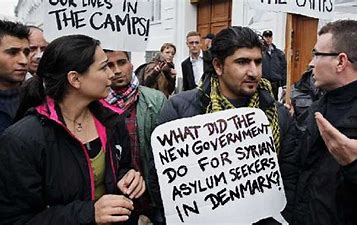
After Syrians began having their residency permits revoked, nearly every person the Danish Refugee Council (DRC) interviewed on the record for the report spoke out against it. Eight of the sources released a joint statement last March criticising the document as “flawed” and flagging their contributions as “underappreciated”.
“I was shocked and could not believe that the entire testimony had been reframed in a way that in the end it came across as the opposite of what I had said,” said Bente Scheller, one of the sources quoted in the report, and the head of the Middle East and North Africa Division at the German foundation Heinrich Böll Stiftung.
Denmark has also revoked the residency of hundreds of Somalis under the same 2015 law now being applied to Syrians. This followed a 2015 fact-finding mission by the Danish Immigration Service that was criticised for never leaving the area around Mogadishu airport, as well as a 2017 joint mission with DRC that was conducted from Kenya for security reasons.
As with Syria, DRC spoke out about the authorities’ use of the report to take away Somalis’ residency. The Danish government refuses to confirm how many Somalis have been deported since then under a secret deal with Mogadishu. Refugee advocates believe many fled to other European countries.
“[DRC is] able to exercise some degree of influence on the process, but it just isn’t enough. They should realise that by now,” said Michala Bendixen, founder of the grassroots Danish charity Refugees Welcome.
To Bendixen, DRC’s funding from the Danish Immigration Service presents a stark conflict of interest. The Danish government was the third largest contributor to DRC’s $500 million annual budget in 2020. That funding included approximately $6.3 million from the Danish Immigration Service for work in Denmark such as assessing difficult asylum claims, including $80,000 to produce COI reports.
“DRC is able to exercise some degree of influence on the process, but it just isn’t enough. They should realise that by now.”
“It’s a huge dilemma when the aims of an organisation are completely the opposite of those of the government, when [the government] is at the same time funding it,” Bendixen said.
DRC says government funding does not affect its independence. While it could point to its public criticism of Danish migration policies, Singer, the head of the asylum department, also acknowledged that the NGO’s cooperation “to some extent legitimises the [COI] report”.
“So we obviously hold this up against an opportunity to qualify and influence the content,” she explained. “That is a fact of life we have to accept, which is also the case when we participate in other asylum-related issues in Denmark.”
DRC has never turned down a request from the immigration service to produce a joint COI report, except due to security concerns for the NGO’s staff, Singer added.
As Danish politics have turned increasingly hardline on migration, DRC’s historically close relationship with the Danish asylum authorities has also been strained, according to Danish migration experts.
“The Danish tradition of NGOs is different to other countries… [DRC’s relationship with authorities] was seen as amicable and non-confrontational,” said Gammeltoft-Hansen, the University of Copenhagen law professor, who has worked with DRC in the past. “But as Danish immigration policy has become more restrictive… those relationships have changed.”
“Something has clearly gone wrong,” said Friis Bach, the former DRC secretary general. “A case like this should certainly prompt some serious thinking about whether one should continue to be part of such a mission.”
Meanwhile, human rights groups have begun to fill in gaps in information about what happens to refugees who return to Syria. Human Rights Watch released a report last October documenting 17 cases of refugees disappearing after returning to Syria, while Amnesty International documented 66 cases of refugees being arrested, tortured, or abused by government authorities upon return. The numbers are by no means a comprehensive count.
One woman told Amnesty that both she and her five-year-old daughter were raped at the border by a Syrian security officer who told her: “Syria is not a hotel that you leave and return to when you want.”
“If I have to leave, I will go to any other country than Syria.”
Back in Denmark, meanwhile, Sara Alderi’s family is living off loans from relatives after her father had to shut down the restaurant he had opened. They live in fear of being separated if Mohammed Tarek and the younger children are taken to a return centre, while the threat of deportation still looms large.
The Danish Immigration Service has told Mohammed Tarek he will be forcibly returned to Syria “when it is possible”, and that he will “not be informed when the return will take place”, according to the official transcript of a recent meeting he had with the agency.
“They know I am not wealthy and will eventually run out of money and have to leave,” he said. “If I have to leave, I will go to any other country than Syria.”
As for the COI report that has upended the life he tried to build in Denmark, “They pick and choose words,” Mohammed Tarek said. “If you ask me, ‘Is Damascus safe?’ I would reply, ‘Yes it’s safe, but not for us – only for Bashar al-Assad and his people’.
“I gave you 100 words but you choose only five: Mohammed Tarek says it’s safe.”
- The New Humanitarian report











